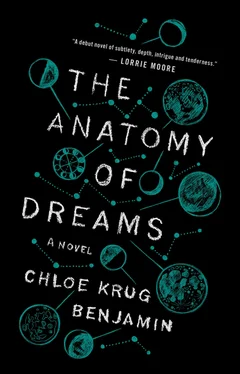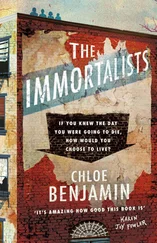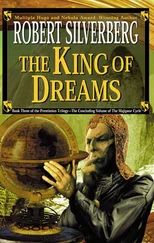Perhaps, I thought, Gabe felt responsible for me and my process of acclimation; perhaps it seemed best to professionalize our interactions now that we were on Keller’s turf and not the floor of David’s empty apartment. But my nerves were a lit city, buzzing with rush-hour traffic. It was Gabe—stocky, bullheaded, conspiracy-theorist Gabe, incorrigible smart-ass, organizer of dining-hall raids—who now went to bed at nine thirty, who brought me out to the back porch and pointed out with hushed solemnity the dark, oily leaflets of poison ivy that crawled across the Vineyard. The Gabe I knew would have trampled through the ivy in bare, callused feet, as if its consequences did not apply to him.
For distraction, I submerged myself in Keller’s research. He was coming back on Monday, so that afternoon, I took the latest volume of Health Psychology and settled in a nook in the library . It was a gorgeous old room, with heavy mahogany furniture and French windows, separated by pillars, which let in great shafts of light. Shelves of old tomes stretched from the floor to the ceiling on one side of the room; against the opposite wall, a trio of leather couches had been arranged in a half hexagon. The wood floor was covered with a ruby-colored afghan, and several tattered leather footstools stood beside the higher bookshelves.
I loved its clarity. The other rooms were cluttered with kitschy, regional bric-a-brac: vases stuffed with seashells, porcelain fishermen, thin floral teacups that trembled hysterically on their shelves whenever somebody walked through the kitchen. More than once I came across a rusty pair of bird-watching binoculars, and on the back porch was a lobster trap, made of wood and netting, that the seminar guests reportedly went wild over. Keller thought the items were junky, but he still employed a live-and-let-live policy, as if they were an inherited nuisance—barnacles on the anchor of the house or native spiders who would, in the end, outlive him. I was not surprised when I learned that he preferred to work in the library.
That day, I was reading Jung’s Memories, Dreams, Reflections —a mystical, ardent little book—while Gabe took a trip to the market. Life has always seemed to me like a plant that lives on its rhizome , Jung wrote. (Next to the world rhizome , someone had written rootstalk in tiny blue print.) Its true life is invisible, hidden in the rhizome. The part that appears above the ground lasts only a single summer. Then it withers away—an ephemeral apparition. When we think of the unending growth and decay of life and civilizations, we cannot escape the impression of absolute nullity. Yet I have never lost the sense of something that lives and endures beneath the eternal flux. What we see is blossom, which passes. The rhizome remains.
I turned the page and found that the text had been blotted out by a dark brown stain—coffee, perhaps—that bled straight through the next ten pages. I held the pages up to the light, but that made them even more indecipherable. I closed the book and walked to the shelves, which had been organized by author. Perhaps, I thought, Keller had additional copies of some of the more famous works, and I was right: there was another Memories, Dreams, Reflections , older but otherwise identical to the one I’d been reading. The book opened reluctantly, glue cracking in the spine. As I flipped through to find my place, three yellow pieces of paper shook out and floated to the ground.
I worried they were pages from the book itself. But when I picked them up, I saw that they came from an old notepad. They were frail and dry, covered in blue ink, and seemed to be part of a letter: each page was inscribed, in the upper right-hand corner, with Zurich, 1978 , and one of the pages—the last, I presumed—was signed with Keller’s name. I glanced at the driveway; Gabe had taken the car to the grocery store one town over. Still standing by the shelves, I began to read the last page:
keep coming back to the idea that the subconscious is made up not only of the awareness of actual experience but also of the awareness of every experience that could have happened—simultaneous potentialities which, although near misses in real life, become fully realized in the life of the brain. It’s my guess that the soul is made up of the sum of these simultaneous potentialities, that the soul has therefore an infinitely tiered or layered psychology and that it is only in traveling through these layers—which extend not up or down but inward—that self-knowledge can be achieved in any depth.
I see this theory as being positioned at the intersection of Jungian psychology and the multiverse theories of William James and Max Tegmark, along with Alan Guth’s more recent theory of parallel universes. I’m not a physicist or a cosmologist, of course, so I’m interested less in the notion of parallel physical universes than in the implications these theories may have for the brain. If we accept the idea that out of the original particles of our universe were created a vast number of identically particled other universes, and that these universes may have evolved differently but all possessed the same original matter and therefore a playing field of identical potential—could the same not be said of the mind?
Jung’s theory of the collective subconscious posits that in addition to the personal subconscious, each member of the human race has a subconscious of the species—a communal memory bank, an infinite vault of human instincts and experiences, which is at every moment expanding, much like the physical universe. If this is true, might the personal consciousness have too an infinite vault, not only of realized individual experience, but of potential individual experience?
I felt a chill behind me. I turned around; the door to the library was open, and Keller stood inside it. He wore a cuffed white shirt and a pair of slacks, creased from the drive; in one hand was a folded paper doggy bag that gave off the overripe, saturated smell of food left in the sun.
“Sylvie,” he said.
“I’m sorry.” I fumbled with the papers, pressing them back into the center of the book. “The other copy had a stain. I didn’t mean to pry.”
Keller crossed to the desk and set the brown bag down. Then he walked back to me and shook my hand.
“And what did you think?”
“Of the Jung? It’s fascinating—I’ve only just started the autobiography, but I read a bit more in college and I can see why you’re—”
“Not of the Jung. Of my letter.”
Keller released my hand and smiled, his mouth closed. My first test. Would it be better to pretend I hadn’t read it? To admit it and compliment him? Either way, it seemed worse to lie.
“I only read part of it,” I said. “So I don’t have much to go on.”
“Well played.” His eyebrows were raised with a boyish kind of delight. “Our very own Pandora. Always open the box. And?”
“I want to know more,” I said haltingly. “I recognized some of it—your theory of simultaneous potentialities—but I didn’t fully understand it.”
“I’m not surprised. I wasn’t much older than you when I wrote that letter—my third year of graduate school. I suppose I’ve kept it for sentimental reasons. The theory itself was in its infancy and rather blurry—like one of those vast gaseous planets that takes shape only when seen from far away.”
I had the strange feeling that he was being self-deprecating for my benefit—was it that he doubted I’d be able to understand and was trying to comfort me? But he was slyer than that; more likely, he was challenging me. I was transfixed by the sight of him. It had been years since I’d seen Keller, but my memories of his classes at Mills were sharp: straining for the answer as he stood stock-still before us, his expression impenetrable as a sphinx, his eyes glinting in the late-afternoon light.
Читать дальше












